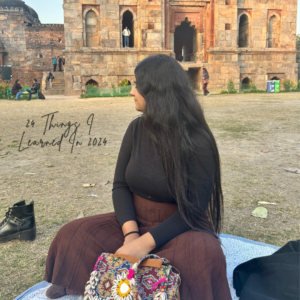I know I didn’t do anything earth-shaking or radical. But in my small inner circle of family, friends, and colleagues, it brought some confusion and skepticism—but also quite a bit of:
It’s about time.
You see, I’ve always had one foot out the door—and I’m not exactly proud to admit this. Ever since I got my first full-time office job, I knew I didn’t want to be there long-term.
One year was my original goal.
Mind you, it wasn’t because I wasn’t thrilled. I absolutely was. My goal was to work in publishing, and getting an editorial role at a big publisher was a dream come true.
But still:
- The work didn’t feel like something I could do forever.
- The commute was long.
- The pay wasn’t satisfactory.
And if I’m being completely honest, I’m someone who constantly seeks change. (When it comes to work. Not so much in life.) So I knew I’d reach my limit at this place eventually.
Things were good, though.
I got a better job than I expected after college and my string of internships. I was learning new things at work, finally going out of the house after the pandemic, working (terribly slowly) on my social skills, and experiencing the corporate life and the publishing life—both of which, I have to say, treated me well so far.
One year turned into two.
After my original goal of finishing a year at that workplace, I tried figuring out where and how to pursue a master’s degree—something I’d wanted since I finished my undergrad. I tried, I researched, I talked, I thought—but it just didn’t work out. For personal, financial, and clarity-related reasons (and a lack of risk-taking abilities), higher studies didn’t quite work out—at least not at this stage of my life.
Meanwhile, I got a promotion at work. I was thrilled. So I naturally stayed a few more months.
However, the thought of leaving and pursuing other interests kept on nagging at me.
I also realised that I wasn’t good at multitasking. I was trying to juggle:
- a full-time job
- learning Korean
- researching master’s programs
- and occasionally working on other projects
I felt like I was failing at all of them—or at best, making very slow progress.
Divided attention just wasn’t serving me anymore.
So, as I got closer to completing three years at the company, I started seriously considering leaving.
Before this, I had asked for advice. I had told nearly everyone around me more than once that I wanted to quit. Yet, months would pass by, and I would neither have a plan nor a resignation letter.
I felt like a coward. Like someone who keeps saying they’ll do something… but never does. I was sick of hearing myself say again and again that I wanted to leave.
I had been waiting for the perfect moment—when I’d have something solid like a job offer or an admissions letter—to justify quitting. But life wasn’t giving me that. I couldn’t seem to make a solid commitment to something else.
So I finally sat down, pulled that nagging feeling out from the back of my mind, looked at it straight, and asked myself: What is stopping me?
And of course, as with most people-pleasers and Indian kids—it was people.
I wanted to look like I had my shit together. I wanted to break the news of some exciting new opportunity before I told people I was leaving my comfortable, stable job.
And I realised how stupid that reason was.
That desire—to be seen as ambitious and sorted—was just ego.
And I had to choose my heart’s desire (and the right decision for my career) over ego and superficiality.
I was also just… done.
- Done feeling stuck and bored.
- Done having so many things I wanted to do but having no energy to do them.
- Done fearing change.
- Done not being who I wanted to be and not doing what I wanted to do in life.
So I journaled. I sat down and wrote:
- Why I wanted to quit and why it made sense to do it right then
- What I’d say to others
- What my next plan (and backup plan) would be
Note that this decision wasn’t just rooted in “I want to follow my dreams.” I did look at the practicality of it.
- Two old freelance clients reached out to me in March and asked if I would work on their new manuscripts. These projects would keep me busy for about two months after my notice period. That gave me confidence—especially to break the news to my parents, who would’ve worried if I had no work or income lined up.
- I had some savings.
- I live with my parents—no rent to pay, so I knew that if I wanted to take a risk, this was a good time.
If any of these factors hadn’t aligned, I might not have made the decision to quit.
I started freelancing as a teenager and did it until my first full-time job. I’d tasted the thrill of being my own boss and working with international clients early on—and I never forgot the sweetness of it.
While I dabbled in projects alongside my full-time job, I barely had the energy or time. So, I always wanted to give full-time freelancing a fair shot and see where I could take it.
I also wanted to give more time to studying Korean. And write more.
And so, I decided I’ll do all that: I would freelance; study Korean; perhaps work on my writing; and give myself space to breathe and figure out my next steps in life—without the Delhi–Noida commute exhausting me.
However, there were still voices around me:
- What if your savings run out?
- What if it takes forever to find another job? Or you can’t find one at all?
- What if you aren’t able to handle the uncertainty of an unstructured routine?
These voices came both from within me and from the people around me.
But still, while I objectively knew all these concerns were valid—I wasn’t worried.
I had a quiet, calm confidence I couldn’t explain to anyone. A confidence that said I would be fine.
The people around me, even the ones close to me, didn’t know my thoughts, experiences, capabilities, mindset, or the kind of work I do as well as I obviously do.
So I didn’t need to listen to them.
Not because I didn’t value their opinions. But because I knew things they didn’t. And I was making my decision based on my knowledge and experience, and everything I knew to be true and had faith in.
That made me feel at ease.
And at the end of the day, I realised: This wasn’t that big a deal.
If I want to quit my job without another lined up—I can. (Of course, this doesn’t apply to someone with major responsibilities to take care of or bills to pay.) If I want to sit idly and just read books for months—I can. If I want to work as a freelancer—I can. If I fail miserably with all my plans and want to go back to corporate life—I can do that too.
So if you’re ever considering doing what I did:
- Weigh your options and analyse your current situation
- Write down your reasons and your plans in detail
- Make a pros and cons list (preferably on a yellow pad like Ted Mosby)
- Do your research and ask for advice
- Ponder over it.
And then: Listen to only yourself.
More than anything, make sure that your gut says you’re doing the right thing.



